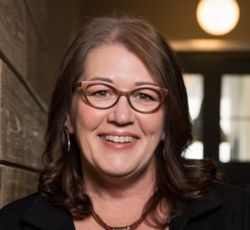
Founder & President, Sorting it Out, Inc.
Living with Generalized Anxiety Disorder & Depression
Diane O’Connell first knew something was wrong when she became overwhelmed at work and found herself crying for days. While this was an extremely difficult time, she moved to stability by seeking to understand her illness. Now, she sees her mental health conditions no differently from a physical ailment. She says, “The mind is part of the body and with care and patience, it can heal.”
Diane’s Story
How has your condition impacted your life?
It has caused me insecurity regarding how I interact with others. I have a tendency to second guess what it is I say and how I process what others say. This takes additional energy in my interactions.
When were you first aware of your condition and what was your most difficult time?
I think I always knew something was going on, but I first became aware of my illness when I got so overwhelmed at work that I found myself crying for days and had to take medical leave to figure out what was going on. This was my most difficult time as I didn’t understand what was going on, and felt embarrassed, like I had failed my team and my family.
What is your life like now? What does success and living well look like for you?
My life is much better now that I understand my illness and what I need to do to take care of myself. Success and living well is something I strive for on a daily basis. Some days are better than others, but I now have a clear understanding of how to recover from the bad days much quicker.
What help or specific strategies helped you to get well and move to stability?
What helped me move to stability, first and foremost, was understanding that there are physical changes that happen to your brain when you have anxiety and depression. It validated my feelings and created an understanding that I couldn’t rush recovery. It put things in context that I needed time, similar to physical therapy after a physical injury.
What do you do to manage your condition and stay healthy on an ongoing basis?
Success for me is a recipe with the following ingredients: pausing, quality sleep, no caffeine, eating healthy, spending time in nature, deep breathing/meditation, proactively managing medication and being candid about how I am feeling when interacting with others. This allows me to be present and focused in whatever I am doing.
Are there positives that have come from having a mental health condition?
Having a mental health condition has given me much more empathy for others as well as myself. Also, it gave me an opportunity to help others through education and support. I have met some amazing people as a result of my being candid anout my condition.
How has your condition impacted your work and your career?
Before I was diagnosed, I was terminated from my job due to a lack of understanding of my condition. This was devastating and exacerbated my feelings of inadequacy and insecurity. But while recovering, I made the decision to change careers to help others understand mental health conditions.
What words of encouragement would you give to someone struggling with a condition similar to yours?
I don’t think anyone should feel inadequate if they have a mental health condition because it is no different than having a physical ailment. The mind is part of the body and with care and patience, it can heal.
What motivated you to join The Stability Network?
I joined the Stability Network because I feel strongly about eliminating the stigma of mental health and am proud to be part of a community whose mission it is to do just that.
What resources (books, videos, websites) have helped and/or inspired you on your journey?
This Too Will Pass: Anxiety in a Professional World, Richard Martin
